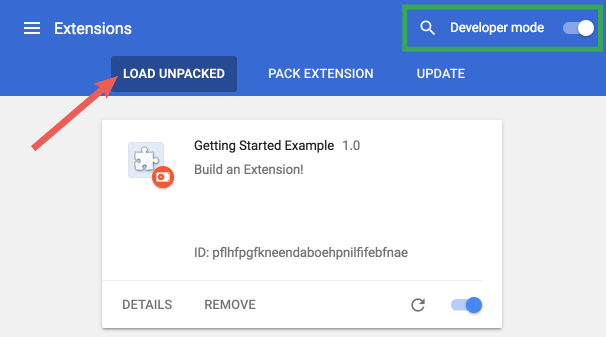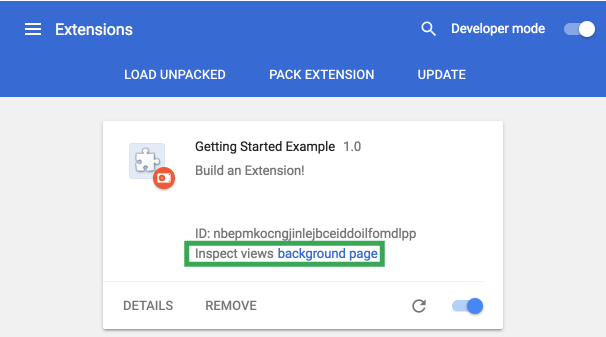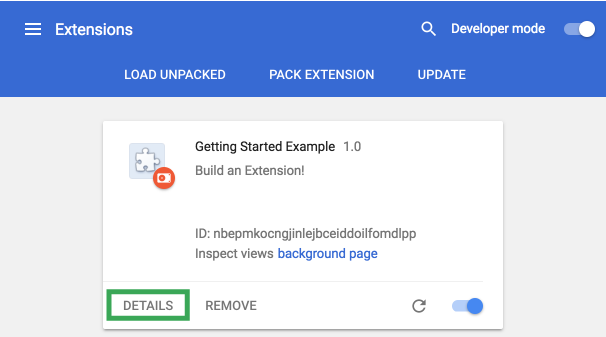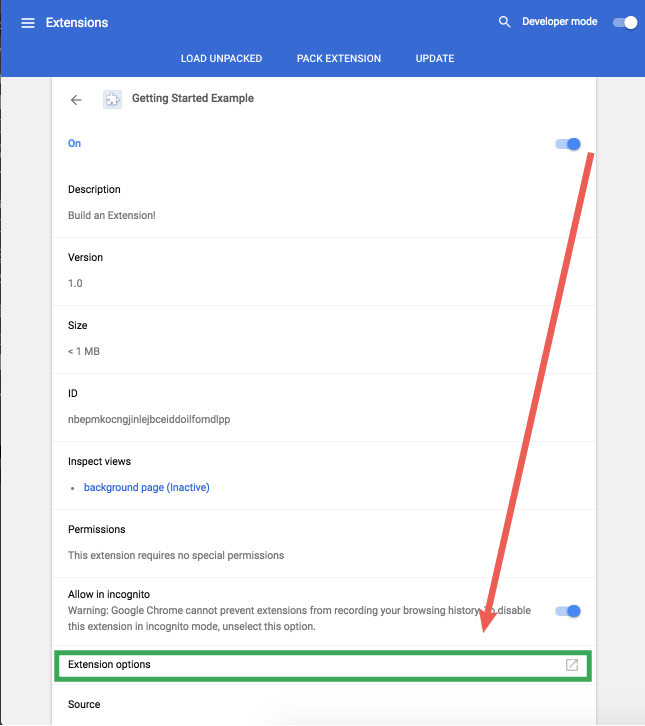# 入门教程
扩展由不同但相互联系的组件组成。组件可以包括 后台脚本,内容脚本,选项页,交互页面和各种逻辑文件。扩展组件是使用 Web 开发技术创建的:HTML,CSS 和 JavaScript。扩展的组件各有其功能,并且是可选的。
本教程将构建一个扩展,允许用户更改 developer.chrome.com 上任何页面的背景颜色。 我们将使用许多核心组件来介绍它们之间的关系。
首先,创建一个新目录来保存扩展名的文件。
完整的扩展程序可以在此处下载。
# 创建 Manifest
扩展始于 manifest,我们先创建一个 manifest.json 文件,包含如下代码。
{
"name": "Getting Started Example",
"version": "1.0",
"description": "Build an Extension!",
"manifest_version": 2
}
包含 manifest 文件的目录可在开发人员模式下以其当前状态添加为扩展。
在浏览器地址栏中输入 chrome://extensions, 打开扩展管理页面。
- 也可以通过单击 Chrome 菜单,将鼠标悬停在更多工具上,然后选择扩展程序来打开扩展程序管理页面。
通过单击开发人员模式旁边的切换开关启用开发人员模式。
单击加载已解压的扩展程序按钮,然后选择扩展目录。

该扩展程序已成功安装。 由于 manifest 中未包含任何图标,因此将为扩展名创建通用工具栏图标。
# 增加指令
尽管已安装完扩展,但还没有程序逻辑。通过创建名为 background.js 的文件并将其放置在扩展目录中,来引入后台脚本。
后台脚本和许多其他重要组件一样必须在 manifest 中注册。 在 manifest 中注册后台脚本会告诉扩展要引用哪个文件,以及该文件的行为。
{
"name": "Getting Started Example",
"version": "1.0",
"description": "Build an Extension!",
"background": {
"scripts": ["background.js"],
"persistent": false
},
"manifest_version": 2
}
现在,该扩展程序知道它包含一个非持久性后台脚本,并将扫描注册文件中需要监听的重要事件。
该插件监听被安装后,来自持久化变量的消息。首先在后台脚本中包含一个 runtime.onInstalled (opens new window) 的监听事件。在 onInstalled 监听器内部,扩展使用 storage (opens new window) API 设置一个值。这将允许多个扩展组件访问该值并进行更新。
chrome.runtime.onInstalled.addListener(function() {
chrome.storage.sync.set({color: '#3aa757'}, function() {
console.log("The color is green.");
});
});
大部分 API,包括 storage (opens new window) api,必须被注册在 manifest 的 permissions 字段中给插件使用。
{
"name": "Getting Started Example",
"version": "1.0",
"description": "Build an Extension!",
"permissions": ["storage"],
"background": {
"scripts": ["background.js"],
"persistent": false
},
"manifest_version": 2
}
进到扩展管理页面,然后单击重新加载。 能看到一个带有蓝色链接(背景页)的新字段 查看视图。

点击链接,查看后台脚本的 console.log。 显示 "The color is green."
# 引入交互界面
扩展可以有多种形式的用户界面,这次我们使用 popup 弹窗。 创建一个名为 popup.html 的文件并将其添加到该目录。该扩展程序通过点击按钮来更改背景颜色。
<!DOCTYPE html>
<html>
<head>
<style>
button {
height: 30px;
width: 30px;
outline: none;
}
</style>
</head>
<body>
<button id="changeColor"></button>
</body>
</html>
与后台脚本一样,需要在 page_action 下的 manifest 中将此文件指定为 popup 弹出窗口。
{
"name": "Getting Started Example",
"version": "1.0",
"description": "Build an Extension!",
"permissions": ["storage"],
"background": {
"scripts": ["background.js"],
"persistent": false
},
"page_action": {
"default_popup": "popup.html"
},
"manifest_version": 2
}
工具栏图标的名称也包含在 page_action 的 default_icons 字段下。 在此处 (opens new window)下载 images 文件夹,将其解压缩,放置在扩展程序的目录中。更新 manifest,以便让扩展程序知道如何使用图像。
{
"name": "Getting Started Example",
"version": "1.0",
"description": "Build an Extension!",
"permissions": ["storage"],
"background": {
"scripts": ["background.js"],
"persistent": false
},
"page_action": {
"default_popup": "popup.html",
"default_icon": {
"16": "images/get_started16.png",
"32": "images/get_started32.png",
"48": "images/get_started48.png",
"128": "images/get_started128.png"
}
},
"manifest_version": 2
}
扩展程序也会在扩展程序管理页面上显示图像,权限警告和网站图标。这些图像在 manifest 的 icons 下指定。
{
"name": "Getting Started Example",
"version": "1.0",
"description": "Build an Extension!",
"permissions": ["storage"],
"background": {
"scripts": ["background.js"],
"persistent": false
},
"page_action": {
"default_popup": "popup.html",
"default_icon": {
"16": "images/get_started16.png",
"32": "images/get_started32.png",
"48": "images/get_started48.png",
"128": "images/get_started128.png"
}
},
"icons": {
"16": "images/get_started16.png",
"32": "images/get_started32.png",
"48": "images/get_started48.png",
"128": "images/get_started128.png"
},
"manifest_version": 2
}
如果在此阶段重新加载扩展,它将包含一个灰度图标,但不会有任何功能差异。因为 page_action 在 manifest 已声明,因此由扩展决定何时告诉浏览器用户可与 popup.html 进行交互。
在 runtime.onInstalled 侦听器事件中,使用 declarativeContent (opens new window) API 将声明的规则添加到后台脚本中。
chrome.runtime.onInstalled.addListener(function() {
chrome.storage.sync.set({color: '#3aa757'}, function() {
console.log('The color is green.');
});
chrome.declarativeContent.onPageChanged.removeRules(undefined, function() {
chrome.declarativeContent.onPageChanged.addRules([{
conditions: [new chrome.declarativeContent.PageStateMatcher({
pageUrl: {hostEquals: 'developer.chrome.com'},
})
],
actions: [new chrome.declarativeContent.ShowPageAction()]
}]);
});
});
此扩展需要 declarativeContent (opens new window) api 的权限。
{
"name": "Getting Started Example",
...
"permissions": ["declarativeContent", "storage"],
...
}
现在,当用户访问到包含 developer.chrome.com 的 URL 时,浏览器将在工具栏中显示一个全彩页面操作图标。当该图标为全彩时,用户可以单击它以查看popup.html。
弹出界面的最后一步是为按钮添加颜色。 使用以下代码创建一个名为 popup.js的文件并将其添加到扩展目录。
let changeColor = document.getElementById('changeColor');
chrome.storage.sync.get('color', function(data) {
changeColor.style.backgroundColor = data.color;
changeColor.setAttribute('value', data.color);
});
此代码从 popup.html 获取按钮,并从存储中拿到颜色值。然后,它将此颜色用作按钮的背景。将 popup.js script 标签包含到 popup.html 中。
<!DOCTYPE html>
<html>
...
<body>
<button id="changeColor"></button>
<script src="popup.js"></script>
</body>
</html>
重新加载扩展以查看绿色按钮。
# 逻辑层
现在,该扩展程序知道该弹出窗口应对 developer.chrome.com 上的用户可用,并显示一个彩色按钮,但需要逻辑来进行进一步的用户交互。更新 popup.js 以包含以下代码。
let changeColor = document.getElementById('changeColor');
...
changeColor.onclick = function(element) {
let color = element.target.value;
chrome.tabs.query({active: true, currentWindow: true}, function(tabs) {
chrome.tabs.executeScript(
tabs[0].id,
{code: 'document.body.style.backgroundColor = "' + color + '";'});
});
};
更新的代码在按钮上添加了 onclick 事件,该事件执行以代码方式注入的内容脚本。将页面的背景色变成与按钮相同的颜色。使用代码注入可以允许用户调用内容脚本,而不用将不需要的代码自动插入到网页中。
manifest 将需要 activeTab 权限,以允许扩展程序临时访问 tabs API。 这使扩展程序可以调用 tabs.executeScript。
{
"name": "Getting Started Example",
...
"permissions": ["activeTab", "declarativeContent", "storage"],
...
}
该扩展程序现在可以正常使用了!重新加载扩展程序,刷新此页面,打开弹出窗口,然后单击按钮将其变为绿色! 但是,某些用户可能希望将背景更改为其他颜色。
# 给用户选项
该扩展程序当前仅允许用户将背景更改为绿色。包含一个选项页面使用户可以更好地控制扩展功能,从而进一步自定义其浏览体验。
首先在目录中创建一个名为 options.html 的文件,并包含以下代码。
<!DOCTYPE html>
<html>
<head>
<style>
button {
height: 30px;
width: 30px;
outline: none;
margin: 10px;
}
</style>
</head>
<body>
<div id="buttonDiv">
</div>
<div>
<p>Choose a different background color!</p>
</div>
</body>
<script src="options.js"></script>
</html>
然后在 manifest 的 options_page 中注册。
{
"name": "Getting Started Example",
...
"options_page": "options.html",
...
"manifest_version": 2
}
重新加载扩展程序,点击详情

向下滚动详细信息页面,然后选择扩展选项以查看选项页面,尽管当前该页面将显示为空白。

最后一步是添加选项逻辑。 使用以下代码在扩展目录中创建一个名为 options.js 的文件。
let page = document.getElementById('buttonDiv');
const kButtonColors = ['#3aa757', '#e8453c', '#f9bb2d', '#4688f1'];
function constructOptions(kButtonColors) {
for (let item of kButtonColors) {
let button = document.createElement('button');
button.style.backgroundColor = item;
button.addEventListener('click', function() {
chrome.storage.sync.set({color: item}, function() {
console.log('color is ' + item);
})
});
page.appendChild(button);
}
}
constructOptions(kButtonColors);
提供了四个颜色选项,然后使用 onclick 事件监听器将它们生成为选项页面上的按钮。用户单击按钮时,它将更新扩展程序全局存储中的颜色值。由于所有扩展名文件都从全局存储中提取颜色信息,因此无需更新其他值。
# 下一步
恭喜你!该目录现在包含一个功能齐全的 Chrome 扩展程序,尽管比较简单。
下一步是什么?
Chrome扩展程序概述在总体上介绍了有关扩展程序架构的详细信息,以及开发人员希望熟悉的一些特定概念。
在调试教程中了解可用于调试扩展的选项。
Chrome 扩展程序可以访问功能强大的 API,而这些 API 均超出开放网络所提供的范围。 chrome.*API文档 (opens new window) 将介绍每个 API。
开发人员指南还有许多其他链接,这些链接指向与高级扩展创建相关的文档。